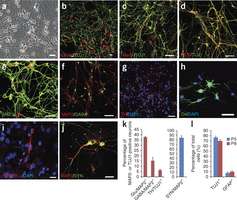December 10, 2012 report
Researchers devise a method for reprogramming cells in urine into neural progenitor cells

(Medical Xpress)—Researchers in China have developed a technique for reprogramming cells found in urine into neural progenitor cells that are capable of growing into neurons. In their paper published in Nature Methods, the team describes how they were able to reprogram kidney epithelial cells found in urine into neural progenitor cells that are suitable for use in studying neural diseases.
The use of stem cells has become popular in the past several years as a means of creating new types of cells from those existing in the body. Cells are reprogrammed by injecting them with a virus that has been designed to activate certain genes to bring about desirable traits in an organism. Doing so makes them pluripotent, which means they are able to re-differentiate into other types of cells.
In this new research, the team found that they could reprogram cells that have disengaged naturally from the lining of the kidneys which make their way into urine samples. In this case, they took samples from three people ages 37, 25 and 10 and reprogrammed the epithelial cells into neural progenitors. Once they had them, the progenitors were then grown in a Petri dish resulting in mature neurons (and glial cells). Upon testing, the neurons were found to be able to generate impulses, indicating they were functioning as normal neurons. Next, the researchers planted the neurons in the brains of test mice and found that they survived for up to at least a month. They report that they don't know yet if the cells might last longer or if the cells would eventually be incorporated into a neural network as a normal part of such a system.
In addition to discovering that cells in urine could be used to create progenitor cells, the researchers also pioneered a new way to reprogram them. Instead of injecting them with viruses, they used snippets of bacterial DNA. Their process, they report takes less time and that the reprogrammed cells are less likely to develop into tumors. Another obvious benefit to the new process is that pluripotent cells can be created using urine samples, rather than by taking blood or performing biopsies – a much less invasive method. The researchers say their process can be used to generate progenitor cells geared towards specific disease related research.
More information: Generation of integration-free neural progenitor cells from cells in human urine, Nature Methods (2012) doi:10.1038/nmeth.2283
Abstract
Human neural stem cells hold great promise for research and therapy in neural disease. We describe the generation of integration-free and expandable human neural progenitor cells (NPCs). We combined an episomal system to deliver reprogramming factors with a chemically defined culture medium to reprogram epithelial-like cells from human urine into NPCs (hUiNPCs). These transgene-free hUiNPCs can self-renew and can differentiate into multiple functional neuronal subtypes and glial cells in vitro. Although functional in vivo analysis is still needed, we report that the cells survive and differentiate upon transplant into newborn rat brain.
© 2012 Medical Xpress

















